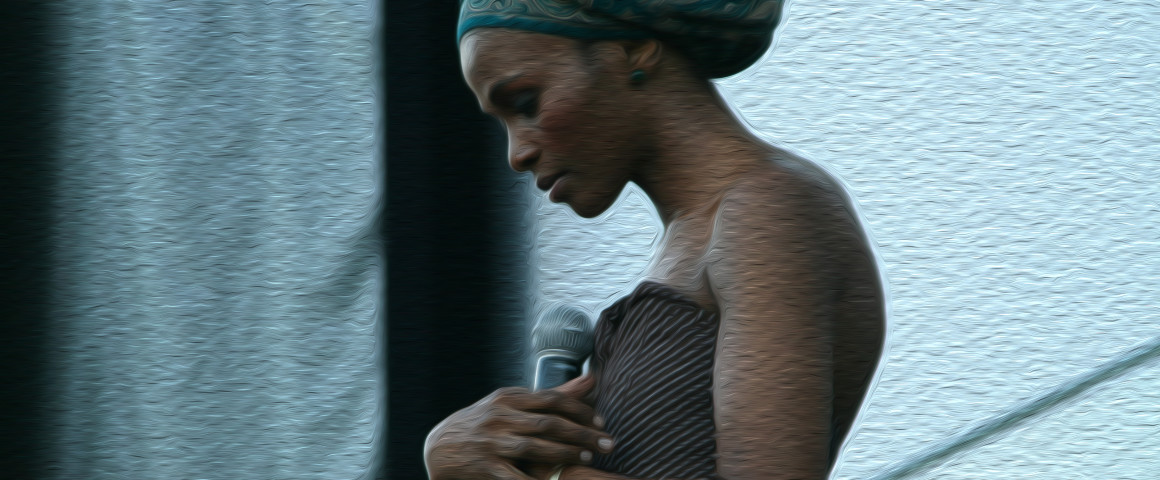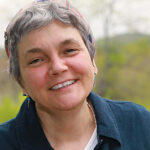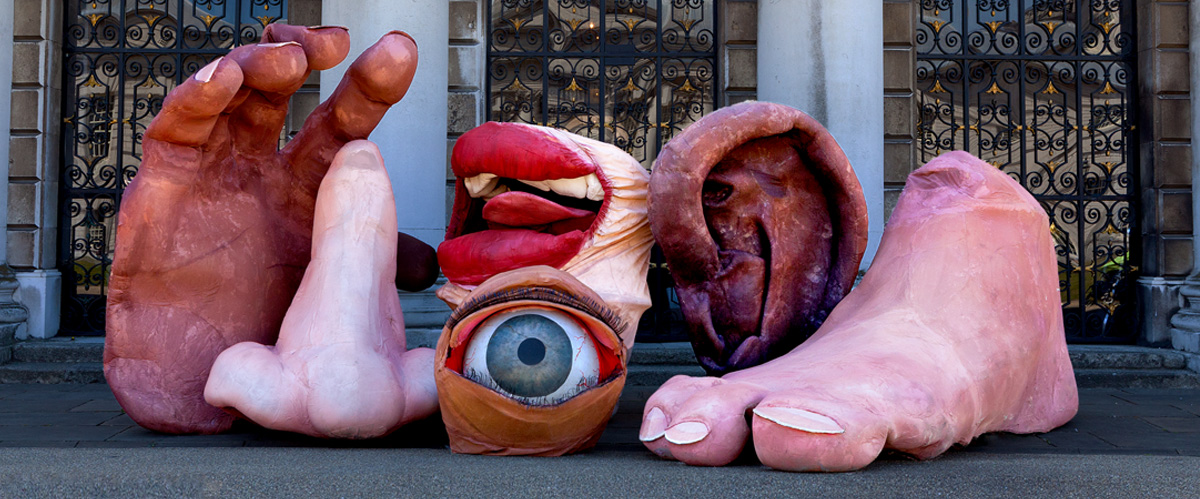Over the last five years, teaching artist, filmmaker, and poet Christian McEwen has interviewed poets as they came to read at Smith College in Northampton, Massachusetts. This spring, many of these interviews will be published by Bauhan Publishing in Sparks from the Anvil: the Smith College Poetry Interviews. Throughout 2015, Teachers & Writers Magazine will publish highlights of this great collection, starting with a two-part interview with Pulitzer Prize-winner Yusef Komunyakaa. In Part One, Komunyakaa talks about growing up in Louisiana; about jazz and the Bible; about cooking and his grandmothers’ influence; and, especially, about poetry as a foundation “that holds us accountable” to both the future and the past.
Yusef Komunyakaa is the author of Blue Notes: Essays, Interviews, and Commentaries; Neon Vernacular: New and Selected Poems; and The Chameleon Couch, among many others. Born in 1947 in Bogalusa, Louisiana, he has been awarded the Kingsley Tufts Poetry Award, the Ruth Lilly Poetry Prize, and a Bronze Star for his service in the Vietnam War. He currently lives in New York City, where he teaches at New York University.
Christian McEwen: I know that you were born in Louisiana, the eldest of six children. You said, “I grew up with some strange characters around me, storytellers and sorcerers….”
Yusef Komunyakaa: I believe that one internalizes a landscape, and that landscape is carried within. I’m thinking particularly about Bogalusa, Louisiana. …I would lose myself in that landscape, it was a place of great meditation. But I didn’t know that growing up. In retrospect, it was a good place to be from, yet when growing up I was told it was a good place to be a long ways from.
There were storytellers. One individual I remember telling ghost stories, and I would always be at the edge of my seat. And there were other storytellers that maybe were closer to folklore. And also there were individuals, teenage boys, who played “The Dozens” and I took that to mean a survival game. One couldn’t get angry…one had to keep a kind of verbal dexterity.
CM: You say in the book Blue Notes, “Many times I’d read poetry in order to establish a moment of contemplation. And other times I’d go out to the wooded areas around my house to allow myself solitude.”
YK: I came to poetry early on in grade school, and I think it was that week called “Negro History Week,” and I discovered Langston Hughes, Paul Laurence Dunbar, Phillis Wheatley, James Weldon Johnson. But also I discovered other poets such as Edgar Allan Poe. I think the first two poems I memorized were James Weldon Johnson’s “The Creation” and “Annabel Lee” by Poe.
But also it’s important for me to say that I read the Bible—we all did at that moment of history in the South—and there’s a certain kind of poetic expression all the way through the Bible. I didn’t realize it was poetry when I was reading it, and how many other poets it probably influenced as well.
CM: When you were in high school you wrote a poem that was a hundred lines long in rhymed quatrains. So clearly you were reading sonnets, ballads, couplets, etc. Did you experience your teachers, your family, as encouraging? Or was it really a long, solitary row to hoe?
YK: I think it was, for the most part. When I wrote that poem, I hadn’t even written a poem before. I was very shy. I didn’t trust my voice. So finally I wrote those hundred lines, and I was too shy to read it. There were very trite rhymes— “success” and “progress.” It was one of those poems that I wrote for my fellow students: trying to propel myself out into the future, and consequently trying to propel them into the future as well.
I didn’t write poetry for a long time after that, but I kept reading it. And I did keep a notebook of sorts, and so poetry was still there. But I didn’t realize that I would actually end up writing poetry. So I surprised myself.
CM: One of the things I notice when I read your work is the extraordinary specificity of the language. I’m thinking of your description of the armadillo: “two quicksilver eyes/ peer out from under a coral helmet/ color of fossil.”
YK: I think that from early on, I wanted to learn the names of things. It’s not so much that in naming things we control them, but more that we attempt to experience what those things are experiencing. So naming things was very important to me. It was a way of seeing, and also discovering language. I love the sounds, you know, associated with those names—the names of trees, the names of flowers, the scientific names as well as the vernacular. How they clash sometimes with each other, and other times how they embrace each other. So that’s important for me—it’s a process of discovery.
CM: In many of your poems, you pay tribute to jazz, and you said that it wasn’t so much what you listened to, but how you listened.
YK: Well, essentially, listening with the whole body: that’s more what it is than anything else. Not just listening with the head, with the mind—because if one listens in that way, the music is abstract. Listening with the whole body, it’s very tangible, it’s a part of oneself, becomes a part of oneself. I think maybe listening to jazz may parallel listening to the deep silence of nature as well.
“Because I think that there’s a kind of singing underneath things, and one doesn’t know if one’s being beckoned, or if one is—if it’s the opposite of that.”
CM: Lovely.
YK: Because I think that there’s a kind of singing underneath things, and one doesn’t know if one’s being beckoned, or if one is—if it’s the opposite of that. Because I believe that in nature, as well as jazz, there’s beauty and terror living side-by-side, coexisting, influencing each other.
I suppose I wish I were a musician, but I’m not a musician. I love listening to music, being challenged by the music.
CM: Has it given you courage in terms of your own writing?
YK: I think so, just the idea of the musician knowing his or her instrument so well that he or she can risk traveling through oneself out into the future. Maybe that’s what poetry is—learning the instrument—and poetry is the instrument as such. Sound is always part of poetry in that way—someone can trust language, taking a risk, going some place that they hadn’t even thought of before, projecting oneself into the future as well as back into the past, and arriving at a place where one finds a certain stable foundation. It is a foundation that holds us accountable.
“Someone can trust language, taking a risk, going some place that they hadn’t even thought of before, projecting oneself into the future as well as back into the past, and arriving at a place where one finds a certain stable foundation. It is a foundation that holds us accountable.”
CM: You first began to write seriously as a student at a poetry workshop in Colorado Springs, and you enjoyed—and I think this was your phrase—“how the work radiated with a number of surprises.”
YK: That was an interesting time because I thought I knew what poetry was, or is, but it became a place of discovery. I’d been drawn early on to very formalized poetry, and the poetry I was reading in Colorado Springs for the most part was actually modernist, and in a way it brought me back to Langston Hughes. I do see Langston Hughes as influenced by the blues tradition, and I grew up with the blues without even knowing it was the blues; everything around me was the blues. And I realized in Colorado Springs that embracing free verse, blank verse, I could sing in a different way and maybe one that was truer to my experiences….
And still the poem was made, I do see the poem as a made thing. And in that way it relates to growing up the son of a carpenter. I admired the precision, but I also admired moments of surprise, the twists and turns an object can embrace, the same way a poem can embrace the twists and turns, the surprises in language. I like writing poems and coming to a phrase where I laugh out loud and I say, “Gosh where did that come from?” Those moments are gifts.
“I grew up with the blues without even knowing it was the blues; everything around
me was the blues.”
CM: One of the things I marvel at is your use of persona. I am tremendously impressed by your ability to take on the voice of a woman.
YK: I grew up very closely related especially to my grandmothers, they were my caretakers in so many ways. And I’m talking not just caretakers of body, but caretakers of the psyche. I think perhaps they taught me how to dream. I really trusted them, and I learned many things from them—and it was just unconscious: I didn’t know that I knew how to cook, you know, but for some reason I always knew how to cook. They’d never really taught me, it was just my observation, watching every move and just taking that all in, listening.
I was back in Louisiana in May of 1982 and I heard my maternal grandmother talking in the next room, and I said, “Oh that’s why, that’s why I have certain expressions in my poems.” It was amazing really. I thought—I had the ego really to believe I… I… had sort of self-invented myself. But that wasn’t the case at all. I had borrowed what was around me, I had internalized what was around me. And yes, the voices of women: singers, seers, workers. I trusted them.
CM: I’m sitting here and thinking about you and Seamus Heaney: how you both managed not to abandon that childhood whilst at the same time going forward into a radiant adulthood. I don’t mean to idealize this, but you have pulled together a very wide range of lives.
YK: Well, one does travel!
CM: One does travel, clearly. As you say yourself, “I am a black man, I am a poet, a bohemian,/ & there isn’t a road my mind doesn’t travel.” I guess my question has to do with your task as a poet of turning the world into the word and vice versa.
YK: I suppose we are responsible for what we witness, what we observe. Not that we attempt to let what we have observed dictate the direction of the poem—but at least it has some deep residence there. What I’m getting at is… I still want the poem to surprise me. I don’t want answers as much as questions. I think questions are what really humanize us, as opposed to answers. And I suppose I want mystery to still reside there as well. I think that’s how poetry became so human, it’s that questioning.
You know, there have been so many nails driven into the coffin of poetry, and yet poetry is still with us. And I think it will continue to be with us—even in an over-technological society, it still resides there. Because poetry, and language as well, maybe, is capable of doing some shape-shifting of its own.
CM: Do you see one of those nails in the coffin of poetry as being the plethora of technologies nowadays, the inundation of information?
YK: I think so. I attempted to resist technology for a long time. For a long time, I didn’t have a computer. But poems are not built out of information, that’s what I mean about surprises: that’s how images dovetail. I cannot see how a poem exists without a composite of images. This is what I believe: that the poem is not really a composite of statements, but a composite of images, along with some minor statements, perhaps.
—September 17, 2013
Northampton, Massachusetts
Editor’s Note: This interview has been edited and condensed for space considerations and clarity.
In this video from the magazine Sampsonia Way, Komunyakaa offers advice for young writers.
Komunyakaa reads “My Father’s Love Letters” from Magic City, his book exploring home, family, race, and music.
In the Summer 2009 issue of Teachers & Writers Magazine, Komunyakaa wrote about collaborations in the essay, “The Spirit of Yes.”
Christian McEwen is a freelance writer and workshop leader originally from the U.K. She is the author of several books, including World Enough & Time: On Creativity and Slowing Down, now in its eighth printing. She edited Jo’s Girls: Tomboy Tales of High Adventure; Sparks from the Anvil: the Smith College Poetry Interviews; and, with Mark Statman, The Alphabet of the Trees: A Guide to Nature Writing. Christian has enjoyed residencies at Yaddo, MacDowell, Mesa Refuge, and the Virginia Center for the Creative Arts, and has received a fellowship in playwriting from the Massachusetts Cultural Council. Her new book, In Praise of Listening, will be published in October.



